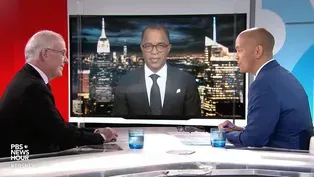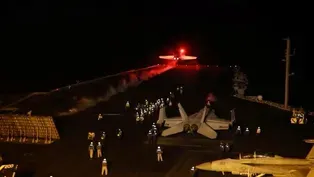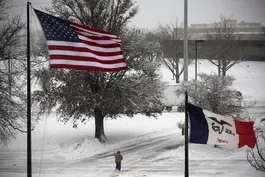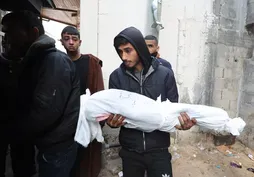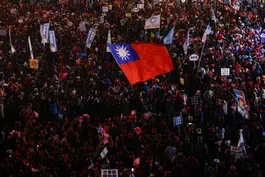
How U.S. strikes on Houthis could alter Middle East conflict
Clip: 1/12/2024 | 5m 23sVideo has Closed Captions
How the U.S.-led strikes on Houthis in Yemen could alter the conflict in the Middle East
The U.S. strikes against Houthis in Yemen mark a significant escalation of tensions in the Middle East. The world is now waiting to see whether the strikes will accomplish their goal to stop the Houthis from harassing ships in the Red Sea or raise the risk of a wider conflict. Geoff Bennett discussed more with Nadwa Al-Dawsari, a nonresident scholar at the Middle East Institute in Washington.
Problems with Closed Captions? Closed Captioning Feedback
Problems with Closed Captions? Closed Captioning Feedback
Major corporate funding for the PBS News Hour is provided by BDO, BNSF, Consumer Cellular, American Cruise Lines, and Raymond James. Funding for the PBS NewsHour Weekend is provided by...

How U.S. strikes on Houthis could alter Middle East conflict
Clip: 1/12/2024 | 5m 23sVideo has Closed Captions
The U.S. strikes against Houthis in Yemen mark a significant escalation of tensions in the Middle East. The world is now waiting to see whether the strikes will accomplish their goal to stop the Houthis from harassing ships in the Red Sea or raise the risk of a wider conflict. Geoff Bennett discussed more with Nadwa Al-Dawsari, a nonresident scholar at the Middle East Institute in Washington.
Problems with Closed Captions? Closed Captioning Feedback
How to Watch PBS News Hour
PBS News Hour is available to stream on pbs.org and the free PBS App, available on iPhone, Apple TV, Android TV, Android smartphones, Amazon Fire TV, Amazon Fire Tablet, Roku, Samsung Smart TV, and Vizio.
Providing Support for PBS.org
Learn Moreabout PBS online sponsorshipescalation of tensions in the Middle# East.
The world is now waiting to see## whether the strikes will accomplish# their goal to stop the Houthis from## targeting ships in the Red Sea or raise# the risk of an even wider conflict.
Nadwa Al-Dawsari was born and raised# in Yemen and is a nonresident scholar## at the Middle East Institute in Washington, D.C.
Thank you for being with us.
And how will the U.S.-led strikes# ho w will that affect the militant group's# strategy moving forward, in your view?
NADWA AL-DAWSARI, Middle East Institute:# Well, I mean, the Houthis have survived## eight years of intense airstrikes# an d they survived that and even# emerged stronger than before.
So, airstrikes might neutralize# the Houthi threat on the Red Sea,## shipping, but that would be temporarily.
GEOFF BENNETT: What impact# will these airstrikes have## on the Houthis' standing in Yemen?# NA DWA AL-DAWSARI: Yemenis are concerned# about these airstrikes because they lived the## horrors of airstrikes for eight years, and these# airstrikes caused a lot of civilian casualties,## a lot of destruction, but also# they made the Houthis stronger.
So Yemenis at large don't want to go through# another episode of airstrikes that only the Houthis, at the expense of Yemenis.
Now,# the Houthis are still extremely unpopular,## but the Houthis are using the Gaza war# and the war with Israel and America,## which is their narrative, that they're# at war with Israel and America,## they're using that to oppress the# population and silence critics They're using that to force families to# send their children to indoctrination camps,## to recruit fighters, to recruit children at a mass# scale.
And so these airstrikes could be very good## for the Houthis.
The Houthis want war.
They want# confrontation for the U.S.
They want confrontation## with Israel because -- and that's why they# continue to attack the ships in the Red Sea.
That's how they build -- they make an# excuse to oppress the population.
So,## this will be good for the# Houthis if it's only airstrikes.
GEOFF BENNETT: Well, in order for# the U.S. goal of deterrence to## be effective on a more permanent basis,# what kind NADWA AL-DAWSARI: Well, the U.S.# -- the Houthis have proven to be a## strategic threat to security, regional# security and internation And so only a strategic approach will mitigate# the Houthi threat.
Now, airstrikes by the U.S.## and the U.K. are not going to address that.
The# U.S. and the international community need to## support Yemeni government forces to weaken# the Houthis militarily and rebuild Yemen.
GEOFF BENNETT: The Houthis, as you# well know, are also backed by Iran,## which has supplied militias across the Middle# East as a way of stepping up its own infl How independent are the Houthis from# Iran?
Are they acting on their own,## or are they following Iran's# instructions right now?
NADWA AL-DAWSARI: It's both.
So the Houthis are not Iran puppets.
They# don't carry Iran order the Houthis are very strong allies with Iran, and# they both have a long-term goal in the region,## which is Iran's expansionist agenda.
And# that includes weakening Saudi Arabia,## taking Mecca and eventually liberating Jerusalem,# in their own words, and destroying Israel,## more importantly, also pushing the# U.S. and the West out of the region.
The Houthis also are capable of acting# on their own.
Iran has empowered the## Houthis and strengthened them.
And# I'm not, even sure if Iran decided## that the Houthis need to de-escalate# today, that the Houthis would do that.
GEOFF BENNETT: The White House says the strikes# last night were not intended to ignite a wid regional war.
You can argue that, with the# U.S.-led attacks against Houthi targets in Yemen,## that the Israel-Hamas war has already# escalated into a regional conflict.
The question is whether or not it# can be contained.
How do you view it?
NADWA AL-DAWSARI: Things could inspire# a lot of control.
The risk is high.
Having said that, I think it's important for the# U.S. and the West to address the Houthi problem,## and that's not going to happen with# airstrikes.
And, also, it's not going## to happen with putting boots on the ground.
A# more sustainable solution would be to work with# the Yemeni government and strengthen Yemeni# forces, so that they can weaken the Houthis.
Now Iran and other proxies might# still exist, but the Houthis have## proven to be the most strategic threat# to everyone, basically, in the region.
GEOFF BENNETT: Nadwa Al-Dawsari is a nonresident## scholar at the Middle East# Institute in Washi Thank you.
NADWA AL-DAWSARI: Thank you
Brooks and Capehart on Iowa expectations, Biden's campaign
Video has Closed Captions
Brooks and Capehart on Iowa expectations and Biden campaign concerns (10m 8s)
Houthis vow revenge after U.S. and U.K. airstrikes in Yemen
Video has Closed Captions
Houthis vow revenge after U.S. and U.K. airstrikes in response to Red Sea attacks (3m 17s)
Iowa 'kingmaker' on the GOP race and white evangelical vote
Video has Closed Captions
Iowa caucus 'kingmaker' on the GOP race and critical white evangelical vote (8m 54s)
New COVID variant responsible for latest wave of infections
Video has Closed Captions
Why experts are concerned about the JN.1 variant responsible for latest COVID wave (6m 55s)
UN agency describes dire humanitarian situation in Gaza
Video has Closed Captions
United Nations relief agency describes the dire humanitarian situation in Gaza (5m 49s)
What's at stake for China and U.S. in Taiwan's elections
Video has Closed Captions
What's at stake for China and U.S. in Taiwan's presidential and parliamentary elections (6m 23s)
Providing Support for PBS.org
Learn Moreabout PBS online sponsorshipMajor corporate funding for the PBS News Hour is provided by BDO, BNSF, Consumer Cellular, American Cruise Lines, and Raymond James. Funding for the PBS NewsHour Weekend is provided by...
